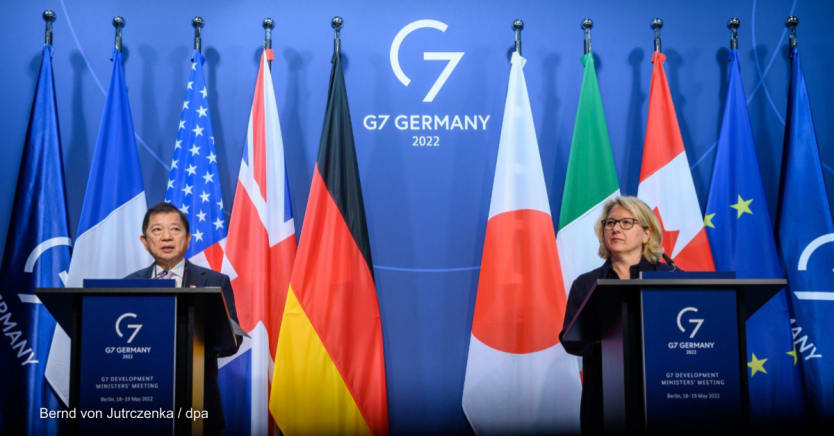
Key G-7 meetings of development and health ministers kicked off this week in Berlin with the launch of an alliance for global food security — a G-7 and World Bank initiative — to coordinate global food security measures.
"The terrible consequences of Russia's war of aggression are being felt way beyond the borders of Ukraine,” German Development Minister Svenja Schulze said in a statement at the start of Wednesday’s meeting of G-7 development ministers.
The Pro read:
What to know about Germany's new development minister
Svenja Schulze guided the country's environment ministry — and now she's taking on BMZ.
“Famines are threatening to break out because Mr Putin is using hunger intentionally as a weapon. To counter this plan, we need to form a new alliance for global food security. We are seeking to adopt just such an alliance at this meeting,” she said. “Other crises, such as the COVID-19 pandemic, climate change, loss of biodiversity and social inequality, still need to be tackled, too, since to some extent they have a mutually reinforcing effect.”
The meetings, which saw development ministers gathering on Wednesday and health leaders on Friday, with a joint session focused on the COVID-19 pandemic on Thursday, offer an opportunity for both groups to set priorities and consider other ambitious proposals, including bids to rethink the global health architecture, ahead of the G-7 summit next month.
At the same time, attention is elsewhere. In Germany, which holds the G-7 presidency, the leadership is focused on the conflict in Ukraine and a looming economic crisis. And the global health community has its attention trained on next week’s World Health Assembly. But experts said there are reasons not to overlook the potential importance of this week’s ministerial meetings.
“The health and development ministers’ meeting is really quite critical,” said Adam Kamradt-Scott, a global health expert at the European University Institute. “It is going to be the ministers who will be making the arguments to the leaders as to what really needs to happen now.”
The countries they represent are among the world’s largest official development assistance contributors and any commitments that come out of the G-7 summit next month could translate into funding and programs.
In its presidency program, Germany emphasized addressing the ongoing pandemic, while preparing for future ones. There is a specific focus on multilateral efforts to address health problems, which has been a hallmark of Berlin’s engagement.
“Famines are threatening to break out because Mr Putin is using hunger intentionally as a weapon. To counter this plan, we need to form a new alliance for global food security.”
— Svenja Schulze, Germany’s development minister“The [German] government is obviously very heavily into multilateralism,” said Amanda Glassman, the executive vice president of the Center for Global Development. She pointed to Germany’s position as the leading funder of the World Health Organization and its commitments to the ACT-Accelerator. “I hope their leadership will influence the rest of the parties at the table,” she said.
The strategy also identifies other traditional German priorities, including tackling antimicrobial resistance and emphasizing a One Health approach that combines consideration of animal, human, and environmental health.
The German technical teams are getting plenty of outside input, with submissions from think tanks, civil society groups, academics, and other engagement groups. Many of those groups have fleshed out vague commitments from the presidency program with their own visions, including of how to deliver on Germany’s call to improve the global health architecture.
For the engagement group of think tanks, known as Think7, Kamradt-Scott co-authored a report calling for “once-in-a-generation reforms to consolidate and harmonize arrangements” in the global health system. It suggests, among other steps, that the G-7 introduce a working group that would consider the benefits of a global body to coordinate the funding and mandates of global health agencies.
“It would work at a much more strategic level and match donors with organizations and their needs,” he said.
It is one in a constellation of suggestions, including stronger connections between health agencies, like WHO, and efforts to mitigate and adapt to climate change. And a reconsideration of the role financial institutions, like the World Bank, should play in preparing for future emergencies.
The G-7 has an opportunity to think about how to begin holistically addressing all of these challenges.
“Can the international community think about the whole system, this is the package we need to put together, this is the amount of money that’s needed,” Glassman said. “We need to think more strategically and more ambitiously about the package we’re offering here.”
At the same time, the gathering of high-income country representatives has to recognize that, while it controls financing for most multilateral organizations, it cannot dictate the global agenda.
“It’s not just about a small club of countries ruling the world and setting all of the policies moving forward,” Kamradt-Scott said. “They need to get much better at engaging other countries.”
There is also some reluctance to raise expectations for the G-7 to deliver anything too sweeping or radical on the global health front, given the other international priorities and recent history. The commitments that emerged from last year’s G-7 summit in the United Kingdom were widely seen as disappointing. In particular, the leaders were faulted for not taking aggressive enough steps to actually meet their pledge to “end the pandemic and prepare for the future.”
“The world was conceivably looking to the G-7 to play a much more significant role than what they ultimately did,” Kamradt-Scott said.
The ministers’ meetings this week will be among the first signals of whether they are willing to step into that role this year.








